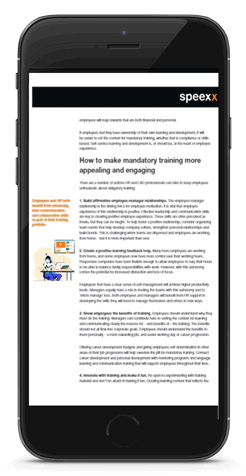Whitepaper
Creative Ways to Keep Up Obligatory Training
How to Inspire and Engage Your Workforce Through Learning and Development Initiatives
In 2020, accelerated digital transformation changed the way employees work and learn overnight. However, almost a year on, employees who responded positively to the initial crisis are growing weary. It is time to review training tactics to keep employees motivated and boost performance.
Whitepaper | Creative Ways to Keep up Obligatory Training
Find out more about creative ways to keep up obligatory training
In this whitepaper

Growing focus on employee experience
Many sectors are growing and businesses are taking on staff. The war for talent is still very much ongoing. Businesses are responding by growing their own in-house pipeline of talent. Employee engagement is central to achieving this – and creative and engaging learning and development opportunities play a vital part. Acknowledging this, increasingly companies are focusing on employee experience (EX) every bit as much as customer experience (CX).
In his HR Predictions for 2021, HR analyst Josh Bersin predicts that employee experience will become part of corporate strategy. He defines EX initiatives as company-wide projects that include HR, IT, legal, facilities, finance, and workplace safety. Employee experience encompasses issues ranging such as work protocols, management support, workplace design, rewards, development, careers, and culture.
Making obligatory training engaging
Recently, out of necessity, learning and development activities may have focused more on upskilling and reskilling employees to handle different ways of working. In 2021, learning and development professionals are looking to broaden their remit once again to empower employees to take control of their own learning and career aspirations. Learning professionals are reassessing how to deliver the optimum mix of mandatory training, job-related skills, and also soft skills such as leadership and communication skills that will support employee career development.
Corporate training is the glue that binds many elements of employee experience. Workplace culture is very often closely aligned with learning culture. The level and quality of management support determine the success of learning. And employee learning activities contribute to their career and personal development. Armed with new skills, employees will reap rewards that are both financial and personal.
Delivering obligatory learning with a human approach
Companies are increasingly taking a more human and creative approach to keeping employees interested in training. Personalized training, matched closely to individual employees is key. Learning content must closely match the employee’s job role and demographic. It must mirror what they see in their working lives and help them with their jobs.
Training must be delivered at the point of need – both at the right time and in the right place. That might mean providing access to training that employees can do during their day-to-day workflow. It might mean designing bite-sized learning for mobile devices. HR and L&D professionals have the opportunity to get creative with corporate training and deliver learning outcomes far beyond previous expectations.
You might also be interested in
Webinar
F2F to Digital Learning – How to successfully adapt

What are the top challenges HR and L&D professionals face when switching from face-to-face (F2F) to digital learning and dealing with accelerated digital transformation? How can you overcome these challenges and what are the top things to keep in mind?
